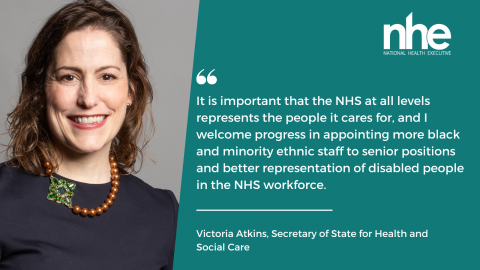The latest NHS Workforce Race Equality Standard (WRES) shows that there are more black and minority ethnic (BME) staff in senior positions than ever before.
BME representation at very senior manager level has increased by over half (61.7%) since 2018 – going from 201 to 325, which is the highest on record.
More than a quarter (26.4%) of the NHS workforce is made up of ethnic minority staff, according to the report.
Nearly half (47.5%) of doctor, dentist and consultant staff are from a BME background – this is closer to a third (33.6%) for nursing, midwifery and health visitor roles.
The NHS Workforce Disability Equality Standard (WDES) also showed that disabled representation on boards increased to 5.7% in 2023, from 4.6% the previous year.
Despite the progress, the two reports also highlighted that more work needs to be done. The WRES showed that white applicants are 1.59 times more likely to be appointed from shortlisting, compared to ethnic minority applicants – the figure was 1.53 in 2022.
Just four in 10 (39.3%) staff from a black background believed their organisation provided equal opportunity for career progression. This statistic was just over half (52.1%) on the WDES, which is an increase from 51.3% in 2022.

Just over one in three (35.2%) disabled staff felt valued for their contribution. A third (33.2%) of disabled of staff also reported bullying, harassment or abuse from patients. The figure was over a seventh (16.1%) and almost a quarter (24.8%) for bullying from managers and colleagues respectively.
The WRES showed that the percentage of staff who had experienced bullying or harassment from colleagues in the previous 12 months was higher for BME staff (27.7%) than for white staff (22%). This has been a pattern since 2015 and is reflected across all regions.
“There are some positive improvements in this year’s WRES and WDES data,” said NHS England’s chief workforce officer, Dr Navina Evans. “But we know there is more to do, and with the NHS workforce more diverse than at any point in its history progress is particularly critical.”
The NHS Confederation’s director of partnerships and equality, Joan Saddler, said that representation alone will not lead to equality.
She said: “It’s about dismantling those structures of power by widening the pool of insight and understanding of what life is like in this country so that all experiences are heard and acted upon.”
NHS Providers’ deputy chief executive, Saffron Cordery, highlighted that the Equality, Diversity and Inclusion Improvement Plan will be pivotal to reversing negative trends.
"The NHS has a zero-tolerance approach to racism, bullying, and harassment, but a renewed focus on equality, diversity and inclusion initiatives and roles in the NHS is vital to stamp out this behaviour,” said Saffron.
To learn more about how the NHS is progressing workforce initiatives, register for National Health Executive’s dedicated online conference.
Image credit: iStock



















